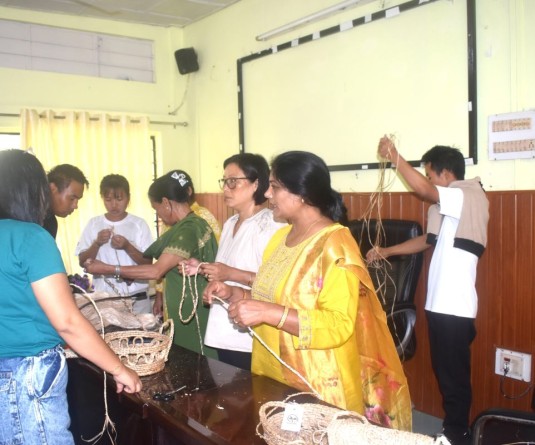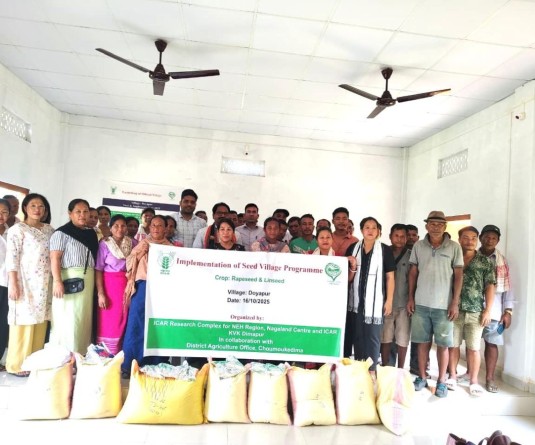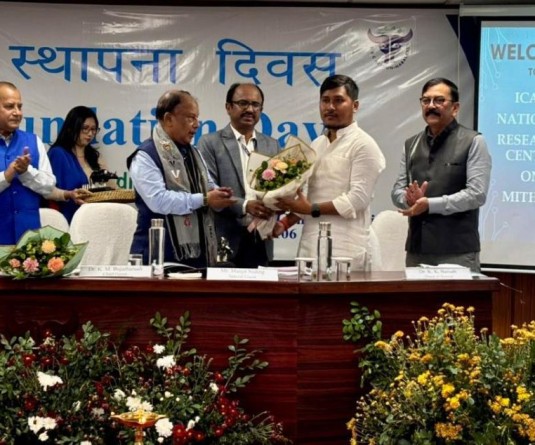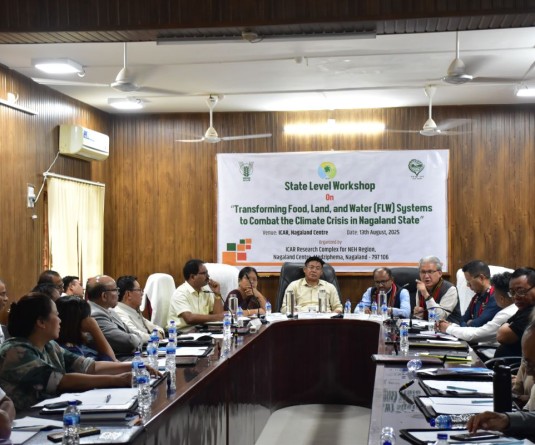
Dr Debojyoti Borkotoky
Subject Matter Specialist(Animal Sc.)
KVK-Phek, ICAR-NRC on Mithun, Nagaland
Indian agriculture faces an array of serious but mitigable problems. One of the major predicaments is low income of the Indian farmers. The foremost reason is the nature of agricultural land holdings. Nearly 86% of farmers are small and marginal with average land holdings in the country being less than 1.1 hectares. Due to the small size and scattered nature of agricultural holdings, the productivity is low and therefore, will not produce enough food to sustain the family. Smallholders are especially vulnerable to the events of climate change (uneven and untimed rainfall, hailstorm, drought, flood, pest infestation etc). Furthermore, the farmer has little or no bargaining power or political influence in securing loans/credits from financial institutions. A fewer than 4% of small holders have agricultural credit cards and very few smallholder farmers hold crop insurance against calamities of nature. They also continue to suffer from market uncertainties. Most agricultural policies (and institutional support) tend to favour prominent farmers and agricultural or food corporations. Industrial agriculture receives 80% of the farm subsidies and 90% of any research funds. All of the above constitute unprecedented agrarian crisis- poverty (87%), malnutrition, dispossession of land assets and death.
With a vision to address the rural agrarian crisis, Department of Agriculture and Cooperation, Ministry of Agriculture, Govt. of India through Small Farmers’ Agribusiness Consortium (SFAC) has identified Farmer Producer organizations (FPOs) registered under special provisions of company act 1957 as a way forward. The objective of FPO is to mobilize and integrate smallholder farmers within an agricultural value chain and build their capacity to collectively leverage their production and marketing strength.
Core values and principles of sustaining FPO.
Value: FPOs are based on the values of self-help, self-responsibility, democracy, equality, equity, honesty, openness, social responsibility and solidarity.
Principles: FPOs are guided by principles imperative for it operations.
Principle 1: Voluntary and open membership: FPOs are voluntary farmer organizations. Membership is open to all persons without any discrimination of gender, racial, religion, political and social status. All person should be agreeable to accept the responsibility and able to use their services.
Principle 2: Democratic Farmer Member Control: FPOs are democratic organizations. The farmer-members actively participate in formulating their policies, making decisions and electing representatives (One member, one Vote).
Principle 3: Farmer-Member Economic participation: The capital of the FPO is equitably contributed by farmer-members and is democratically managed. A part of the capital is usually a common property of the FPO. Farmer-members by democratic approval allocate surpluses in developing their FPO by setting up reserves, benefiting members in proportion to their transactions with the FPO and supporting other activities.
Principle 4: Autonomy and independence: FPOs are autonomous organizations controlled by their farmer members. The nature of autonomy and democratic control by farmer-members should be ensures on entering into agreement with other agencies or organizations including government, or raising fund from external source.
Principle 5: Education, Training and Information: To contribute effectively to the development of their FPOs, it is imperative to provide education and training for the farmer-members, elected representatives, managers and employees.
Principle 6: Cooperation among FPOs: By working together through local, national, regional and international structures, FPOs serves their members most efficiently and strengthen the FPO movement.
Principle 7: FPOs work for sustainable development of their community through policies.
FPO promotion and development process.
Cluster identification: Cluster areas are to be selected by the Resource Institution (RI) appointed by SFAC or State Government directly.
Diagnostic study: The study is conducted by RI in selected cluster area to assess the preliminary situation of the farmers and the level of agriculture in the area. The study will assist in identifying the potential interventions required and understand the specific project implementation context.
Feasibility analysis: Feasibility analysis for the formation of FPO will be conducted by RI covering aspect such as financial, technical, legal, political, environmental, socio-cultural, economic and resource.
Baseline assessment: Baseline assessment will be carried out by RI. The baseline data will establish the prevailing situation in agricultural practices and socio-economic condition of farmers. The data will assist us in identifying the potential interventions and to develop a business plan.
Business planning: Business plan will be carried out by Resource Institution (RI) with the help of selected farmers’ representative. A business plan with appropriate projections on various aspects needs to be developed based on which emerging FPO is formed. The key is to develop business plan in detail with atleast 10% of FPO farmer members to provide clear vision.
Mobilization of farmers: The Resource Institution (RI) will mobilize farmers into groups of between 15 to 20 members at the village level (called Farmer Interest Group or FIGs). Mobilization of the farmers will be done with a variety of communication aids like-pamplets, posters, documentary shows, village-level meetings etc. The FIGs will build up their associations to an appropriate federation i.e. Farmer Producer Organization (FPO).
Organizing and formalizing: Typically, around 50 to 70 FIGs can come together to form a FPO. The FPO can be registered under the Producer Company provision under the Company Act.
Resource mobilization: The resource must be mobilized by RI before initiating the operations of a FPO with the help of the FPO representatives and the Board of Directors (BoDs). Financial, human (staff), technical and physical resource should be acquired during this particular stage. The RI should communicate with various financial agencies and mobilize resources for hiring/purchasing and developing various resources.
Management system development: Resource Institution (RI) will facilitate the development of management systems in the FPO. A guideline should be established to address all aspect of financial, input and output services. A system will be developed related to management of finance, stock and inventory, internal audit, procurement and quality management, marketing and human resource.
Business operations: RIs should train both the governing and operational structure of the FPO in order to ensure smooth functioning of business operation (entire value-chain) viz. procurement, processing, marketing and financial service activities.
Assessment and Audit: RIs should facilitate constant assessment of performance of various stakeholders’ farmer-members, governing board of directors and service providers. Internal process and accounting audits will help maintain both transparency and accountability.
Structure of FPO
General body (GB): The general body is the highest authority and the members of the FPO acts through the general body. The GB approves the annual budgets, authorizes the bonus shares to the members, appointment of auditors and approving any other vital managemental subjects.
Board of Directors (BoD): Board of Directors are elected by the members. BoD may act collectively only through meetings. The Board may act only in areas not reserved to the General Body.
Chief Executive Officer (CEO) & FPO staff: Office bearers of the FPOs are selected / appointed to look after the day-to-day affairs of the Producer Company. The office bearers include Chief Executive Officer (CEO), accountant, godown keeper, etc. The company pays salaries to all the office bearers
Legal formalities for formation of a Producer Company
The process of registering a Producer Company is akin to that of a Private Limited Company. Digital Signature (DSC) and Director Identification Number (DIN) must be obtained of the nominated Director of the company. An application for name reservation (maximum 4 names in order of preference) is to be filed with the relevant Registrar of Companies (ROC). The name of a producer company must end with the words “Producer Limited Company”. After the name is approved by the ROC, the Memorandum of Association is to be drafted by incorporating all the objects that the company intends to undertake. The Articles of Association is to be drafted containing all the by-laws of the company. A declaration by a professional has to be drafted in the format of form INC – 8. An affidavit has to be signed by all the subscribers of the proposed company declaring their legal competency to act as the subscribers. A utility bill and a NOC have to be taken from the owner whose address is to be used as the registered office of the company. If it is not owned, a lease agreement will be attached to the form. The directors will give their consent to act in the Form DIR – 2 and details in DIR – 8. All the drafted documents will be attached to Form INC – 7, INC – 22 and DIR – 12 and uploaded to the ROC website. On proper verification, the ROC will issue a Certificate of Incorporation and the farmer producer company/organization can start its business operations.
Activities of the FPO:
As exemplified in already registered FPOs in India, the typical business would be:
Contract farming: Aggregation and sale of agricultural and livestock produce raised under contract farming.
Production and sale of certified and foundation level seeds: Production and sale of certified and foundation level seeds grown under seed production contracts with public and private organizations.
Supply of agriculture inputs and implements (Agro-service Centre): Supply of agriculture inputs and implements (seed, fertilizer, power tiller, land leveller, seed driller, multi crop planter, paddy transplanter, sprayers, combine harvester etc), including financial and logistics services (like modern storage, transport, etc.). The earning will be from the sale or rental of these inputs/equipments.
Agriculture extension/Agri -information centre: Testing lab for soil & water, creating panel of experts for providing services on payment basis, knowledge dissemination centre, arrange training to farmers.
Agro-Storage centre: Existing storage facility can be upgraded or construction of new godown can be undertaken along with sorting/ grading unit. This will enable them to issue warehouse receipts. Based on these receipts, the farmers can get loan against the crop stored and can cultivate the next crop. Thus, the farmers will be facilitated to get better price by holding the crops.
Agro-processing centre: a. Primary Processing: Sorting, grading unit, waxing/ polishing unit, pre-cooling chambers, extracting and filtering oils, candling eggs, pasteurisation of milk etc. b. Secondary Processing: Value addition to produce e.g. Mini rice mill, flour mill, processed dairy products (paneer, curd, ice-cream, sweets etc), horticulture produce processing etc.
Agri-transportation & Marketing Facilities: Procurement of produce, direct market linkage after aggregation (spot exchange mechanisms) and/ or processing, setting up of rural mart etc.
Service to its member:
Input service supply: The FPO will provide low cost and quality input (seeds, fertilizer, pesticides, pump sets, micro-irrigation sets etc) to the farmer members.
Technical services: The FPO will work towards raising level of knowledge and skill in agricultural production, marketing, value addition etc.
Financial services: The FPO will provide loans for crops, livestock, purchase of agriculture equipments like pump-sets, power-tillers, sprayers etc, construction of livestock sheds etc.
Procurement, packaging service & Marketing services: The FPO will procure agriculture produce from its farmer members. The organization will also do the storage, processing, value addition and packaging. The FPO will do direct marketing. This will support the farmers during distress sale, transaction losses, weightment losses, price fluctuation, transportation losses etc.
Insurance services: The FPO will provide various insurance services like crop insurance, equipment insurance and life insurance.
Networking services: The FPO will facilitate linkage of farmer members to financial institutions, government programmes and other service providers.
Fortunately, FPOs are now taking the lead in ensuring farmers' livelihoods. FPOs are not just sustainable but also flourishing. As on 30.06.2020, SFAC has helped 853 FPOs in registering as companies across India. Some of the FPOs has earned accolade through their impeccable management, diligence and farmer development initiatives viz Kamareddy Progressive Farmers Producer Company Ltd (KPFPCL), Telengana (2,200 farmer-shareholders), Samruddhi Mahila Crop Producer Company Ltd, Rajasthan (2,200 women farmers), Vasundhara Agri-Horti Producer Co. Ltd (VAPCOL), Maharastra (41,000 members in 6 states), RamRahim Pragati Producer Company Ltd, Madhya Pradesh (4200 members) and so on. Further, under Deendayal Antyodaya Yojana- National Rural Livelihood Mission (DAY-NRLM), Ministry of Rural Development, Government of India, is promoting FPOs by mobilizing farmers. So far, 131 registered FPOs have been promoted under the Mission. To encourage more farmers to set up FPOs, Government is providing assistance to FPOs such as Equity Grant Scheme, Credit Guarantee Fund Scheme through SFAC. In addition, FPOs can also avail assistance under various schemes of the Government of India such as Agricultural Marketing Infrastructure (AMI), Venture Capital Assistance (VCA) and Mission for Integrated Development of Horticulture (MIDH) Scheme for promoting their agri-business activities. SFAC and NABARD have facilitated training to Board of Directors, Chief Executives Officers of FPOs to enable them to function effectively. Further, Indian Council of Agricultural Research (ICAR) is providing technical support to FPOs through Krishi Vigyan Kendras (KVKs) of the respective districts in the form of capacity development of its members of various aspects of agriculture and allied sectors including production technologies, processing, value addition and marketing.






